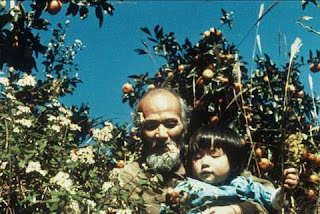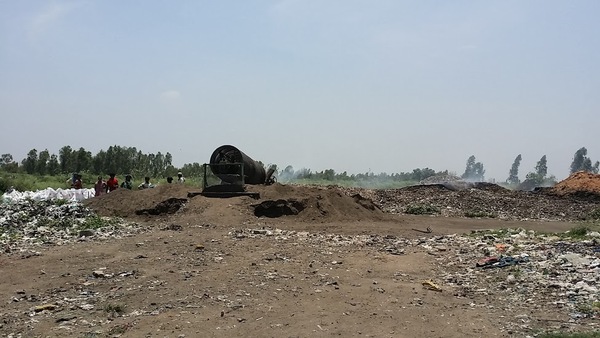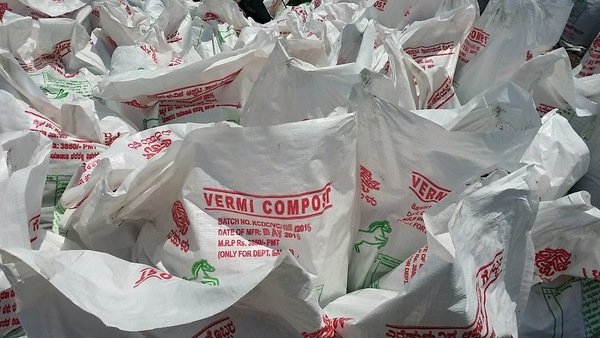कुदरत को पहचानना मानव के बस की बात नहीं है !
फुकुओकाइधर कुछ समय से मेरे मन में विचार आ रहा है कि किसी भी निष्कर्ष पर पहुंचने के लिए किसानों के साथ वैज्ञानिक, कलाकार, दार्शनिक और धार्मिक लोग यहां आएं और इन खेतों को देखें और आपस में बातचीत करें और सब लोग अपनी विशेषज्ञता को कुछ छण भूल कर फिर निष्कर्ष निकालें की आखिर यह क्या है?
वैज्ञानिक सोचते हैं कि वे प्रकृति को समझ सकते हैं। वे यह दावा इसलिए करते हैं कि उनको इस बात का पूरा विश्वास हो चुका है कि वे प्रकृति को जान सकते हैं। वे प्रकृति की जांच कर, उसे मानव के लिए उपयोगी बनाने के लिए प्रतिबद्ध हैं। लेकिन मेरे विचार से कुदरत को समझना इंसान के बीएस की बात नहीं है।
यहां पहाडि़यों पर झोपडि़यों में रहते हुए प्राकृतिक खेती में मदद करते हुए कुछ सीखनेवाले युवाओं से, मैं अक्सर कहता हूं कि पहाड़ पर उग रहे वृक्षों को तो कोई भी देख सकता है। उनकी पत्तियों का हरापन तो नजर आता है। धान के पौधें को भी वे देख सकते हैं। वे सोचते हैं कि उन्हें पता है हरियाली क्या है। रात-दिन कुदरत के संपर्क में आते हुए वे समझने लगते हैं कि वे कुदरत को जान गए हैं। लेकिन जैसे ही उन्हें लगने लगे कि वे कुदरत को समझने लगे हैं, तब उन्हें समझ लेना चाहिए की वे गलत रास्ते पर हैं।
आखिर कुदरत को समझना असंभव क्यों है?
जिस चीज को हम कुदरत मानते हैं, वह वास्तव में हर व्यक्ति के दिमाग में उठनेवाला उसका अपना विचार मात्र है।
जिन्हें वास्तविक प्रकृति दिखाई देती है वे हैं बच्चे वे ही बगैरसोच समझ के कुदरत को सीधे और स्पष्ट देख सकते हैं।
यदि हम पौधें के नाम भी पता कर लेते हैं कि यह नारंगी की प्रजाति का मेंडेरिन संतरा है, या वह देवदार-जाति की चीड़ पेड़ है, तो भी कुदरत अपने असली रूप में नहीं नजर आती है।
पूर्णता से अलग करके देखी हुई कोई भी वस्तु असली नहीं होती है।
भिन्न२ डाक्टरी से जुड़े लोग जब खेतों में धान के एक पौधे को जांचते हैं, तो कीड़ों की बीमारियों के विशेषज्ञ को केवल कीड़े से हुई क्षति ही नजर आती है, खादों के विशेषज्ञ केवल पौधे में पोषकता की कमी पर ध्यान देता है।
आज की स्थिति में इस डाक्टरी की अज्ञानता से बचना ना मुमकिन है।
उदाहरण के तौर पर, अनुसंधान केंद्र से आए एक डाक्टर से, जब वह धान के टिड्डे और मेरे खेत की मकडि़यों की जांच-पड़ताल कर रहा था, मैंने कहा, महोदय, चूंकि आप मकडि़यों पर अनुसंधान कर रहे हैं, इसलिए आपकी दिलचस्पी, टिड्डे के बहुत से अन्य कुदरती -दुश्मनो में से केवल मकड़ी में ही है।
इस साल मकडि़यां बहुत पैदा हो गई है, लेकिन पिछले साल यहां टोड बहुत थे, इसके पिछले साल यहाँ संख्या मेंढकों बहुत थी।
ऐसे परिवर्तन यहां अक्सर देखे जा सकते हैं।
जीव जंतु ,कीड़े मकोड़ों के आपसी संबंधों की जटिलताएं भी इतनी है कि किसी भी विशेष रिसर्च के तहत किसी खास वक्त पर किसी एक कीड़ों के दुश्मन की भूमिका को समझ पाना असंभव है। कुछ ऐसे भी मौसम होते हैं, जब पत्तियों पर बैठने वाले टिड्डों की आबादी कम होती है तब मकडि़यों की संख्या ज्यादा होती है ऐसे भी दिन होते हैं जब बारिश खूब हो जाने से मेंढक खूब हो जाते हैं और मकडि़यों को चट कर जाते हैं या फिर बारिश कम होने से न तो टिड्डे नजर आते हैं न मेंढक दिखाई देते हैं।
कीट- नियंत्रण की सामान्य जैविक विधियां जो खुद कीटों की परस्पर संबंधों को नजरअंदाज करती है, बिल्कुल बेकार हैं । मकडि़यों और टिड्डों पर रिसर्च करते समय मेंढकों और मकडि़यों के बीच के संबंधों पर भी विचार किया जाना चाहिए तब बात इस मुकाम पर पहुंचेगी जिसमे हमें मेंढक विशेषज्ञ की भी जरूरत पड़ेगी, बाद में इस शोध् में मकड़ी, टिड्डा तथा चावल विशेषज्ञ के अलावा एक जल-प्रबंध्न विशेषज्ञ को भी शामिल करना होगा, इसके अलावा इन खेतों में मकडि़यों की भी चार या पांच किस्में हैं।
मुझे याद है कुछ बरस पहले एक व्यक्ति सुबह-सुबह मेरे घर दौड़ा आया और पूछने लगा कि, ‘क्या मैंने अपने खेतों को रेशम की जाली या किसी ऐसी चीज से ढंक दिया है।’ मेरी समझ में नहीं आया कि वह क्या कह रहा है सो मैं खुद अपनी आंखें से मामला क्या है, यह देखने भागा तो पाया की हम लोगों ने कुछ ही समय पूर्व चावल की फसल काटी थी, और रातों-रात धान के ठूंठ और नीचे उगी हुई घास मकड़ी के जालों के ढंक गई थी। वही रेशम की चादर जैसे दिखाई दे रही थी सुबह के कोहरे में चमकते और लहराते वे मकड़ी के जाले एक शानदार दृश्य उपस्थित कर रहे थे।
इस अद्भुत घटना के बारे में खास बात यह है कि जब भी ऐसा होता है और यह बहुत दिनों में एक
बार होता है, तो वह सिर्फ एक या दो दिनों तक टिकता है। ध्यान से देखने पर यह पता चलेगा कि हर वर्ग इंच क्षेत्रा में कई-कई मकडि़यां हैं। वे खेत में इतनी सघनता से फैली रहती हैं कि आपको कहीं, खाली जगह दिखाई ही नहीं देगी। एक चैथाई एकड़ छेत्र में तो हजारों-लाखों की तादाद में भी हो सकती हैं , दो-तीन दिन बाद खेत पर जाने पर कई-कई गज लंबे जालों के टुकड़े टूट कर हवा में लहराते हैं, और हर जाले के साथ पांच-छह मकडि़यां चिपकी हुई होती है। यह नजारा वैसा ही होता है, जैसे हवा में देवदार के बीज या डेंडेलियन के रोयें उड़ गए हो। नन्हीं-नन्हीं मकडि़यों जालों के टुकड़ों से चिपटी आसमान मैं तैरती-इतराती रहती है। इस अद्भुत प्राकृतिक लीला को देखकर आप सहमत होंगे कि कवियों और कलाकारों को भी इस सम्मेलन में शरीक होेना चाहिए।
जैसे ही रसायन खेत में छिड़के जाते हैं, यह सब क्षण भर में नष्ट हो जाता है। एक बार मैंने सोचा कि चूल्हों की राख इन पर छिड़कने में कोई हर्ज नहीं होगा। उसका नतीजा यह हुआ कि दो या तीन दिन बाद खेत में एक भी मकड़ी नहीं थी। राख के कारण जाली के तिनके अपने आप बिखर गए थे, और हजारों-लाखों मकडि़यां मुट्ठी भर, मासूम नजर आनेवाली राख की बलि चढ़ गई। कीटनाशक का प्रयोग सिर्फ टिड्डों या उसके कुदरती दुश्मनो से निजात पाने का ही मामला नहीं है। इससे कुदरत के कई जरूरी काम भी प्रभावित होते हैं।
शरद ऋतु में इन मकडि़यों के झुंडों का धान के खेतों में आने, और इस तरह अचानक गायब हो जाने का रहस्य अभी तक समझा नहीं जा सका है। कोई नहीं जानता कि वे यहाँ पर कहां से आती हैं, सर्दियों में कैसे जिंदा रहती हैं तथा गायब होने पर वे कहां चली जाती हैं।
यानी रसायनों का उपयोग केवल कीटनाशक -वैज्ञानिकों के मतलब की बात नहीं है , दार्शनिकों, धर्म गुरुओं , कलाकारों तथा कवियों को भी यह तय करने में मदद करनी होगी कि रासायनिक कीटनाशकों का उपयोग करना चाहिए या नहीं, या जैव- कीट नाशक के प्रयोग भी सही हैं या नहीं ?
इस जमीन पर चैथाई एकड़ से हम लगभग एक टन ( एक किलो /वर्ग मीटर ) चावल तथा इतनी ही रबी की गेंहूँ /सरसों की फसल लेेंगे, यदि फसल ऊपर तक पहुंच जाती है, जैसा कि कई बार होता है, तो इससे ज्यादा पैदावार आपको खोजने पर भी शायद कहीं भी पैदा होती नहीं मिलेगी।
चूंकि इस अनाज की खेती के साथ आधुनिक वैज्ञानिक तकनीक का कोई वास्ता नहीं रहा, यह आधुनिक विज्ञान की गलतयों का एक प्रत्यक्ष प्रमाण है।
जो भी यहां आकर इन खेतों को देखता है वह मान लेता है कि कुदरत को समझ पाना इंसान के बस की बात नहीं है , विज्ञान ने हमारी केवल इतनी सेवा की है की उसने हमे बता दिया है की हम कुछ नहीं जानते हैं।































